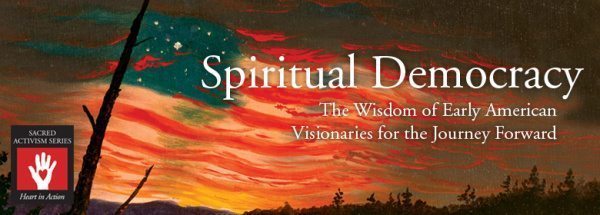In Spiritual Democracy: The Wisdom of Early American Visionaries for the Journey Forward, Steven Herrmann writes:
Whitman’s acute awareness of the inherent relationship between sexuality and spirituality shows clearly how his understandings of the poet-shaman’s function as a preserver of the psychic integrity of the community relates to the “All,” and is aligned with the most progressive spiritual traditions. In Hinduism and Judaism, for instance, sex and spirit are not split off from the body. Rather, they are united on a plane of mystical realization, where the heavenly marriage and earthly marriage are intertwined as one. Jung has a salient passage about this kind of embodied marriage in Mysterium Coniunctionis that illuminates this meaning. He says, concisely: “Sexuality does not exclude spirituality nor spirituality sexuality, for in God all opposites are abolished.” That is Whitman’s point exactly.
Might it be wise for the integrity of depth-psychology to make same-sex marriage pivotal in the discussion of all branches of psychotherapy today, when marriage is becoming such a pressing issue for our nation? It seems so, particularly as Whitman’s important vision of Spiritual Democracy holds up a nonprejudicial possibility for the present cultural and political debates, and for the practices of psychotherapy across the helping professions as a whole. Let us listen to Whitman, in the early candlelight of old age, speak for himself a century and a half ago:
From another point of view “Leaves of Grass” is avowedly the song of Sex and Amativeness, and even Animality—though meanings that do not usually go along with those words are behind all, and will duly emerge; and all are sought to be lifted into a different light and atmosphere. . . . Difficult as it will be, it has become, in my opinion, imperative to achieve a shifted attitude from superior men and women toward the thought and fact of sexuality, as an element in character, personality, the emotions, and theme in literature . . . the spirit in which they are spoken, permeate all “Leaves of Grass,” and the work must stand or fall with them, as the human body and soul must remain as an entirety.
What Whitman brought to the field of American poetry is a unitary awareness of the body and soul as equals, of men and women as equals, and of heterosexuals and homosexuals as equals, and of sex and spirit also as equals. Unlike all previous religious dispensations the world over, Whitman rendered the consummate marriage of the soul with God, not in heterosexual imagery, but in bisexual imagery, which certainly might have met with the approval of Freud. He did this for an important reason: his celebration of the democratization of the whole person began with himself as a “Personality,” as one democratic “Individual”: a “Human Being.”
Whitman sidestepped convention and allowed the light of the lunar masculinity he embraced as a route to the wholeness he was envisioning to reflect a “different relative attitude toward God.” In so doing he paved the way toward a fairer and more democratic nonbiased future. This is where Whitman speaks like an Old Testament prophet, with the voice of liberty, conviction, and justice, as an American. He corrects for the violation done to same-sex couples by insisting that the foundation of the world—the body and sex—be preserved as sacred.
Whitman’s religious idea of Spiritual Democracy appears to be based upon a trinitarian notion, and in this sense his anticipations are in accord with the predictions of Emerson that America would produce a “newborn bard of the Holy Spirit.” Whitman added to this that many would follow him toward personal fulfillment. In this sense, Spiritual Democracy appears to be post-Christian and ecumenical. In “Passage to India,” Whitman puts it this way:
“Trinitas divine shall be gloriously accomplish’d and compacted / by the true son of God, the poet, / Nature and Man shall be disjoin’d and diffused no more, / The true son of God shall absolutely fuse them.”
Here again is the idea of the poet-as-preserver, but for Whitman this function of integrity extends to the poet’s duty to protect the environment, as well, with “ardor like mine.” By putting his own personality on record as having a particular “nature,” Whitman was advancing a new theory of the relativity of our individual means of accessing God in a way that had never been voiced before. He knew that the meanings behind his references would duly emerge in a different science, one that would accept individual differences in the way nature is embodied.
Steven Herrmann has taught courses on Whitman and Melville at the C. G. Jung Institutes of San Francisco, Chicago, and Zurich, as well as at the Washington Friends of Walt Whitman, UC Berkeley, and UC Santa Cruz. Herrmann’s expertise in Jungian Literary Criticism makes him one of the seminal thinkers in the international field and the foremost authority on Whitman and Melville in post-Jungian studies. Herrmann practices as a Jungian psychotherapist in Oakland, California.

